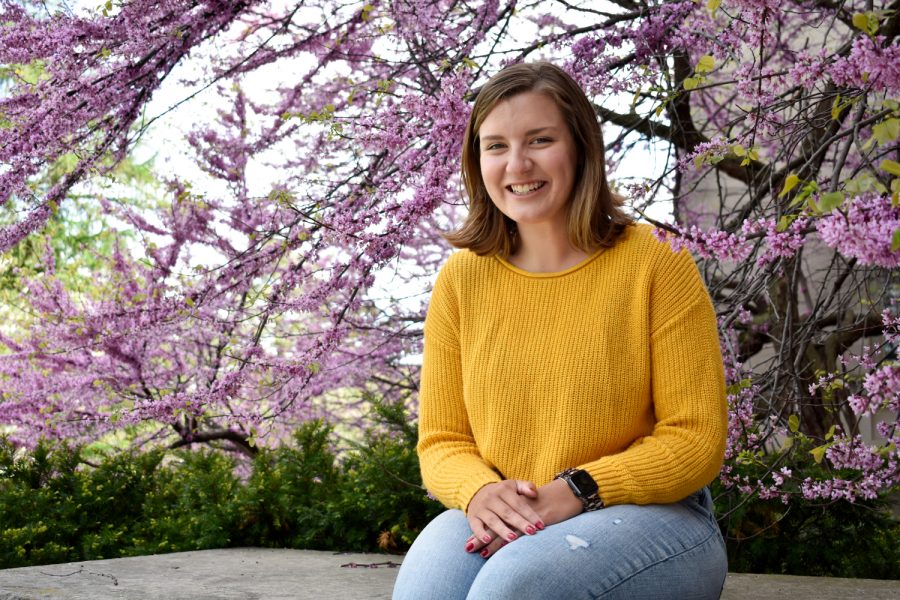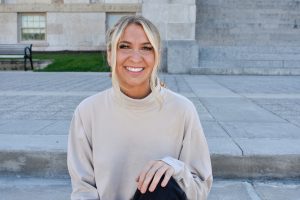Graduating founder of Hawk the Vote helped evolve civic engagement for the pandemic
The pandemic halted in-person Hawk the Vote activities, but organizers say working virtually made volunteering more accessible and allowed them to reach more students. Jocelyn Roof, the organization’s founder, and a graduating senior, started Hawk the Vote during her college career to get more Hawkeyes civically engaged. Now, as she hoped, it’ll outlive her tenure.
Joceyln Roof poses for a portrait at the Pentacrest on Tuesday, May 5, 2021.
May 11, 2021
To gear up for the Iowa caucuses, Hawk the Vote held a mock caucus in January 2020 with 300 participants packed in a room. At the time, the organizers didn’t know how drastically their student engagement strategies would have to change in the coming months.
The pandemic forced Hawk the Vote to conduct more virtual organizing to get students involved in the political process.
“It was a lot more in person stuff, and I think I realized we were going to have to shift in April of last year,” said Executive Director of Hawk the Vote Jocelyn Roof, a graduating senior. “We kind of took a break during spring break to see how things were going to go and then we realized pretty quickly that we were going to be virtual for a long time.”
Previously, Hawk the Vote would set up a table at the University of Iowa Pentacrest and talk to new students at the Iowa Memorial Union during welcome week to get students to update their voter registration. They had also been holding events for students to meet candidates and spreading the word when candidates were coming to town.
Hawk the Vote started pushing engagement more virtually for the primary election in June 2020 by upping their social media usage and sending out emails. In preparation for On Iowa, the week of programming for first-year students leading up to the start of the school year, they created buttons with QR codes that had information on voter registration, instead of setting up a table in person.
Hawk the Vote had also been planning to launch the 90 Percent Challenge – which asked campus organizations to have 90 percent of their eligible members registered to vote – and a voting ambassador program. They went ahead with both those initiatives virtually.
Roof said it was important to recruit volunteers across different groups, majors and departments. Senior Associate Director of Student Development and Events Kara Park, who works in Student-Athlete Academic Services, connected Hawk the Vote with a member of each sports team, Roof said.
“We reached out in different colleges, different student organizations to try and recruit voting ambassadors for each of those,” Roof said. “And then we created an online training program and then we had weekly Zoom calls with all of our voting ambassadors.”
She estimated there were 100 voting ambassadors organizing digitally through text messaging, direct messages, and emails to individuals, as well as some presentations to student organizations over Zoom.
“We found that doing friend-to-friend contact, and peer-to-peer was a lot more meaningful, and we had really high response rates on that, and so we tried to just do recruitment on the front end of people who had different networks that didn’t overlap that much, so that then we were just asking people to talk to people they knew personally,” Roof said.
Hawk the Vote had to communicate more information about voting by mail. Many students wanted to vote by mail in their hometowns, so organizers had to learn about the absentee voting process in different states. Roof said Hawk the Vote used resources from national nonpartisan student voting nonprofits to share that information.
Roof said the challenges the pandemic created pushed the organizing from Hawk the Vote to become better.
“I think 2020 forced us to think outside the box a lot more than we were planning to, and I think ultimately that it led to …. a more successful and more accessible initiative, and so I’m really proud of the fact that we were able to involve so many different volunteers who were interested in becoming involved,” she said.” … It made me feel really good that we were able to include so many more people because we switched to digital.”
Roof will graduate this spring with a double major in sociology and political science, and a certificate in social science analytics. She said her proudest achievement has been founding Hawk the Vote and turning it into an independent initiative focused on civic engagement among students. She wanted to create something that would outlive her time at Iowa.
Now as she prepares to leave, Joseph Verry will take over as executive director. Verry said the work Hawk the Vote has done in the last year taught him how their organizing can be more accessible than it used to be.
He has also learned more about being intentional with how much time it takes to communicate with students, because organizers needed to be mindful of Zoom fatigue when presenting to students.
“When we look back at the mock caucus … it’s not a very accessible event that we held just because the caucuses in general aren’t that accessible, and it’s not very respectful of people’s time because it took two and a half hours to conduct,” Verry said. “So, we can still express that information and educate people without requiring them to dedicate that much time to do something like that.”
Verry said in the upcoming races he wants to emphasize the importance of elections on every level of government. He also wants Hawk the Vote to expand their voting ambassador program to an even larger and more diverse group of students.
After graduating, Roof wants to continue working in the student civic engagement space through universities or high schools and show students how to get involved through voting, going to city council meetings, writing op-eds, or running for office.
“I think [Hawk the Vote has] really given me an appreciation of helping other people recognize the power that they can have even just as individuals,” she said. “Hopefully, whatever I’m doing next, I’ll be able to kind of work with people to help them see the civic power that they have.”






